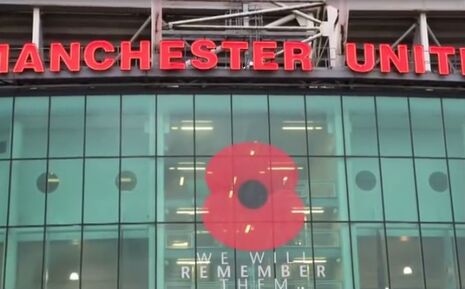In football fields, poppies should grow
Charlie Stone outlines the flaws of FIFA’s ban on the England and Scotland teams wearing poppies at Friday night’s World Cup qualifier

On Friday evening, the England and Scotland football teams are set to defy a FIFA ban on wearing black armbands featuring poppies during their World Cup qualifier.
The 11th November is, of course, the day when the United Kingdom traditionally remembers its war dead, with the poppy representing the immeasurable sacrifices made by those soldiers who have died for Britain since the Royal British Legion introduced it as a symbol after its formation in 1921. And over the decades, in the weeks leading up to and around the 11th November, many British sporting teams have had the poppy emblazoned upon their chests and have held minutes of silence before matches to pay their respects to the fallen.
FIFA, though, have inexplicably stepped in and banned the poppy for both national teams’ World Cup qualifiers, citing the organisation's long-standing prohibition of the inclusion of political, religious or commercial messages on shirts.
Never, however, has the governing body of world football specified the punishment that would be exerted upon the Football Associations (FAs) of countries not complying with this ban. In fact, FIFA Secretary General Fatma Samba Diouf Samoura warned that “any kind of sanction could follow” after reiterating FIFA’s reasoning behind the ban by remarking that “Britain is not the only country that has been suffering from the result of war.”
This is undeniably true, but contrasts markedly with FIFA’s stance in previous years. Indeed, it emerged soon after the announcement of the poppy ban that on the 25th March, Republic of Ireland players wore a political symbol on their shirts in a friendly against Switzerland to mark one hundred years since the Easter Rising. In 2011 too, the English FA managed to reach an amicable compromise with FIFA that allowed the England team to wear a poppy printed on an armband for a friendly match against Spain.
Understandably, Damian Collins MP – chairman of the House of Commons’ Culture, Media and Sport Select Committee – has called on FIFA to “clarify the issue”, while Prime Minister Theresa May was a bit more blunt, calling the stance “outrageous”. FIFA’s perplexing response: to commence disciplinary proceedings against the Republic of Ireland’s Football Association for their act of remembrance in March.
Clearly, then, the governing body of world football is guilty of double standards – but FIFA has never exactly been the bastion of justice and morality in the footballing world. In light of what the rules say, though, it is worth examining whether the poppy nowadays is really a political symbol. Indeed, a spokeswoman from the Royal British Legion – founders of the Poppy Appeal – insists that it is not a “sign of support for war” but rather one of “remembrance and hope”.
However, not everyone considers the poppy to be apolitical. While it was certainly not introduced for political purposes – it was introduced to raise money for WW1 veterans to help with employment and housing – as early as the 1930s there have been movements against it. The Peace Pledge Union introduced the white poppy at this time, arguing its red counterpart was associated with “military power and the justification of war”, and the white poppy is still seen occasionally around today.
Furthermore, some WW2 veterans have refused the red poppy, arguing that the Blair government’s decision to wage war in Afghanistan and Iraq took away the spirit of their generation. Others, though, maintain that it is simply and truly a sign of respect for Britain’s fallen soldiers.
Therefore, it must be concluded that the reason why FIFA considers it a problem for British football teams to wear a poppy is a precautionary one, based on the fact that it means different things to different people.
But they are wrong to intervene on two counts. First, a total ban is far too extreme. Some people refuse to wear poppies for very valid reasons, and should of course not be lambasted for their choice. Others, though, deserve equal respect for choosing to wear one. It it highly probable that the great majority of those who wear poppies are not doing so in order to glorify war, but to remember the dead; just as those who choose not to wear one are not slandering the fallen but making a political point. Indeed, it is ultimately a matter of autonomy and choice that FIFA cannot deny to anyone.
Secondly, and more importantly, FIFA’s intervention has diverted focus from where it should really be. It has become a story of the conflict between FIFA and the English and Scottish FAs, and not about remembering those who have lost their lives.
Thus, instead of sitting down to watch the match with one eye on the news to see what sanctions may be imposed on the FAs for follow for their act of defiance, football fans and the media alike should remember the real meaning of today, paying their respects to the sacrifices made by soldiers who have died fighting for Britain
 Comment / Plastic pubs: the problem with Cambridge alehouses 5 January 2026
Comment / Plastic pubs: the problem with Cambridge alehouses 5 January 2026 News / Cambridge businesses concerned infrastructure delays will hurt growth5 January 2026
News / Cambridge businesses concerned infrastructure delays will hurt growth5 January 2026 News / Cambridge academics stand out in King’s 2026 Honours List2 January 2026
News / Cambridge academics stand out in King’s 2026 Honours List2 January 2026 News / AstraZeneca sues for £32 million over faulty construction at Cambridge Campus31 December 2025
News / AstraZeneca sues for £32 million over faulty construction at Cambridge Campus31 December 2025 Interviews / You don’t need to peak at Cambridge, says Robin Harding31 December 2025
Interviews / You don’t need to peak at Cambridge, says Robin Harding31 December 2025









